HISTORY / Europe / Russia & the Former Soviet Union
Showing results 1-7 of 7
Filter Results OPEN +

The Soviet Writers' Union and Its Leaders
Studies in Russian Literature and Theory
This book argues that Stalin chose Writers’ Union leaders, such as Maxim Gorky and Alexandr Fadeyev, whose psychologies he could exploit. He ensured their loyalty with material benefits but also with a philosophical argument calculated to assuage their moral qualms about supporting the regime.
Optical Play
Studies in Russian Literature and Theory
Longlist finalist, 2015 Historia Nova Prize for Best Book on Russian Intellectual and Cultural History Julia Bekman Chadaga’s ambitious study posits that glass—in...
Making Modernism Soviet
Making Modernism Soviet provides a new understanding of the ideological engagement of Russian modern artists such as Kazimir Malevich, Alexander Rodchenko, and Vera Ermolaeva with the political and social agenda of the Bolsheviks in the chaotic years immediately following the Russian Revolution. Focusing on the relationship between power brokers and cultural institutions under conditions of state patronage, Pamela Kachurin lays to rest the myth of the imposition of control from above upon a victimized artistic community.
Rites of Place
Ranging widely across time and geography, Rites of Place is to date the most comprehensive and diverse example of memory studies in the Russian and East European fields. Leading scholars consider how public rituals and the commemoration of historically significant sites facilitate a sense of community, shape cultural identity, and promote political ideologies.
Just Assassins
Just Assassins examines terrorism as it’s manifested in Russian culture past and present, with essays devoted to Russian literature, film, and theater; historical narrative; and even amateur memoir, songs, and poetry posted on the Internet. Along with editor Anthony Anemone’s introduction, these essays chart the evolution of modern political terrorism in Russia, from the Decembrist uprising to the horrific school siege in Beslan in 2004, showing how Russia’s cultural engagement with its legacy of terrorism speaks to the wider world.
Siberia, Siberia
Valentin Rasputin—one of the most gifted and influential Russian prose writers of the past thirty years—offers a sweeping account of and penetrating reflection on the Russians' four hundred...
To the Memory of Childhood
For years Lydia Chukovskaya's support for persecuted writers cut her off from her own audience. Even her name was banned in the USSR, and she was expelled from the Union of Writers in 1974. Though unable to publish at home and cut off from contacts with readers and editors, Chukovskaya continued to write. To the Memory of Childhood, her loving chronicle of growing up beside the Gulf of Finland with her father, the writer Kornei Chukovsky, reveals the sources of her strength and her belief in the power of the written word.

The Soviet Writers' Union and Its Leaders
Studies in Russian Literature and Theory
This book argues that Stalin chose Writers’ Union leaders, such as Maxim Gorky and Alexandr Fadeyev, whose psychologies he could exploit. He ensured their loyalty with material benefits but also with a philosophical argument calculated to assuage their moral qualms about supporting the regime.
Optical Play
Studies in Russian Literature and Theory
Making Modernism Soviet
Rites of Place
Ranging widely across time and geography, Rites of Place is to date the most comprehensive and diverse example of memory studies in the Russian and East European fields. Leading scholars consider how public rituals and the commemoration of historically significant sites facilitate a sense of community, shape cultural identity, and promote political ideologies.
Just Assassins
Just Assassins examines terrorism as it’s manifested in Russian culture past and present, with essays devoted to Russian literature, film, and theater; historical narrative; and even amateur memoir, songs, and poetry posted on the Internet. Along with editor Anthony Anemone’s introduction, these essays chart the evolution of modern political terrorism in Russia, from the Decembrist uprising to the horrific school siege in Beslan in 2004, showing how Russia’s cultural engagement with its legacy of terrorism speaks to the wider world.







